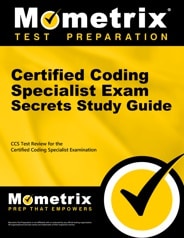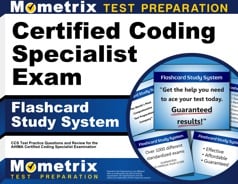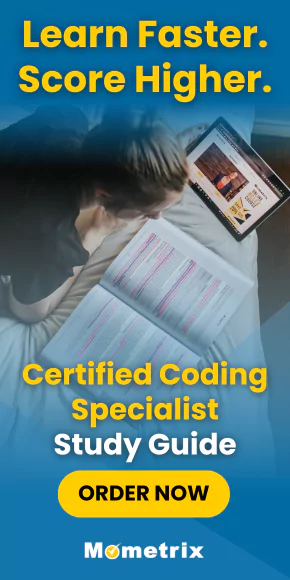The American Health Information Management Association (AHIMA) developed the Certified Coding Specialist (CCS) credential to recognize Coding Specialists who have demonstrated a practitioner’s tested skills in data quality and accuracy as well as exhibiting mastery of coding proficiency.
Click “Start Test” above to take a free Certified Coding Specialist practice test, and check out our premium-quality Certified Coding Specialist test prep resources by clicking the links below!
Exam Eligibility
The following are not technically requirements for taking the CCS exam. However, AHIMA strongly recommends that you have at least one of the following:
- One year of coding experience directly applying codes, and educational courses in anatomy & physiology, pathophysiology, pharmacology, medical terminology, reimbursement methodology, intermediate/advanced ICD diagnostic coding, Healthcare Common Procedure Coding System (HCPCS), and Current Procedural Terminology (CPT) coding experience
- Two years of related coding experience directly applying codes
- One year of coding experience directly applying codes and hold a Certified Coding Associate (CCA) credential
- Hold a coding credential from a certifying organization other than AHIMA and one-year coding experience directly applying codes
- Hold a Certified Coding Specialist – Physician-based (CCS-P), Registered Health Information Technician (RHIT), or Registered Health Information Administrator (RHIA) credential
Certified Coding Specialist Exam Outline
The Certified Coding Specialist exam contains 107 questions, 10 of which are unscored, and you will be given a time limit of 4 hours.
The exam is split into 5 domains, each of which has its own set of tasks.
1. Coding Knowledge and Skills (39%-41%)
- Assign diagnosis and procedure codes based on health record documentation
- Determine the principal or first-listed diagnosis procedure
- Apply coding conventions and guidelines
- Attach CPT/HCPCS modifiers to outpatient procedures
- Determine appropriate sequencing of diagnoses and procedure codes
- Apply POA guidelines
- Demonstrate knowledge of coding edits
- Demonstrate knowledge of reimbursement classifications
- Abstract applicable information from health records
- Identify major co-morbid conditions (MCC) and co-morbid conditions (CC)
2. Coding Documentation (18%-22%)
- Resolve conflicting documentation in the health record
- Ensure all required documentation for assigning a specified code is available
- Verify and validate documentation
3. Provider Queries (9%-11%)
- Identify elements of an ethical complaint query
- Determine if a provider query is compliant
- Analyze current documentation to identify query opportunities
4. Regulatory Compliance (18%-22%)
- Ensure completeness and accuracy of health records
- Understand appropriate payer-specific guidelines
- Identify PSIs and HACs based on the provider’s documentation
- Ensure compliance with HIPAA guidelines
- Ensure adherence to AHIMA Standards of Ethical Coding
- Ensure compliance with the UHDDS
5. Information Technologies (9%-11%)
- Distinguish various types of EHRs
- Demonstrate a basic understanding of encoding and grouper software
- Exhibit an understanding of CAC software
- Ensure compliance with HITECH guidelines
Check Out Mometrix's Certified Coding Specialist Study Guide
Get practice questions, video tutorials, and detailed study lessons
Get Your Study Guide
How to Pass
Think you aren’t a good test-taker? Maybe on a study-time crunch? Or just don’t know how to begin studying? Mometrix has designed a new Study Secrets course to help every student, no matter what study scenario you are in. Here’s what you’ll find in the Study Secrets Course:
- Techniques to Conquer Procrastination
- Steps to building a Study Plan custom to your learning style
- 7 Effective Note-Taking Methods
- Test-Taking Tips
- Memory Techniques and Mnemonics
- And much more!
Everyone learns differently, so we’ve tailored our Study Secrets Course to ensure every learner has what they need to prepare for their upcoming exam or semester. Click below to check it out!
Exam Registration
Once you have determined that you are ready to take the exam, you can apply by visiting the AHIMA website. All applications must be submitted online, and fees are only payable online by credit card. The testing fee is $299 for AHIMA members and $399 for non-members.
AHIMA reviews each application that is submitted. If it is determined that you are eligible, Pearson Vue sends an Authorization to Test (ATT) email. Check the information on the ATT for inaccuracies, and then follow the directions to schedule your exam at a Pearson Vue testing center convenient to you.
You have 120 days to schedule your exam. If you do not set your appointment during the exam window, your application is rejected, and you will have to apply and pay the testing fee again.
If your application is denied, AHIMA will notify you by email about the requirements you need to sit for the exam.
Required Code Books
The CCS exam requires candidates to obtain and bring the code books listed below to their testing appointment:
- One ICD-10-CM code book (2024) from the approved list below
- One ICD-10-PCS code book (2024) from the approved list below
- American Medical Association’s CPT® 2024 Professional Edition (ISBN# 978-1-64016-284-6)
Click below to view the full list of approved code books for the test. 2024 code books are effective until 4/30/2025.
You can make handwritten notations or comments in your code books, as long as the books are free of any notes containing coding rules and guidelines from reference materials other than the allowed code books. Your code books must also be free from handmade tabs, Post-it notes, and loose materials.
Test Day
On the day of your exam, you should arrive 30 minutes before your appointment time. Once you arrive, you will be asked to present two valid forms of identification and your code books for approval. During the check-in process, your photograph, signature, and palm vein pattern will be captured for identification and security purposes.
Before you enter the testing room, you will be asked to leave all personal items in a secure locker. Personal items include things like your cell phone, bags, hats, watches, food, books, and pencils.
Once you enter the testing room, you will be given a dry-erase board and a dry-erase marker to take notes. You cannot take anything else with you to your testing room.
Exam Scores
Once you have completed the exam, the proctor will provide you with a copy of your score report, which indicates whether or not you passed. You must achieve a scaled score of 300 to pass the exam.
Retaking the Test
If you did not pass the exam and would like to retake it, you must wait a minimum of 90 days. To retake the exam, complete a new application and submit the testing fee of $299 for AHIMA members ($399 for non-members). You do not need to resubmit your transcripts with a retake application.
You can submit your application during your waiting period, but your authorization to test will not be issued until 90 days have passed.
Check Out Mometrix's Certified Coding Specialist Study Guide
Get complex subjects broken down into easily understandable concepts
Get Your Flashcards
FAQs
Q
How many questions are on the CCS exam?
A
There are between 107 questions on the exam.
Q
How long is the CCS exam?
A
The time limit for the exam is 4 hours.
Q
What is the passing score for the CCS exam?
A
To pass the exam, you will need a scaled score of at least 300.
Q
How much does the CCS exam cost?
A
The examination fee is $299 for AHIMA members and $399 for non-members.


